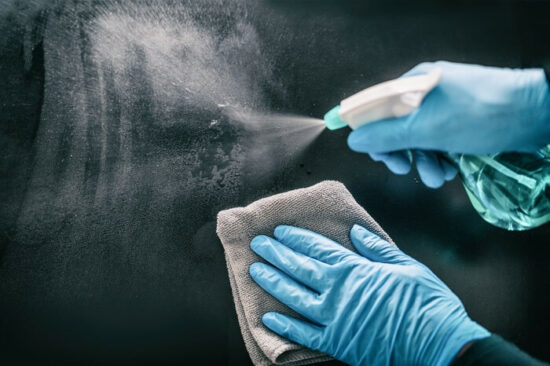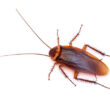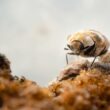“Does bleach kill roaches?” is probably one of the most common questions we see when it comes to these hated pests. Bleach is simple, available, and it’s only natural that many homeowners turn to it when brainstorming how to get rid of these insects.
But the answer isn’t as simple as you might think. This guide covers everything you need to know about using bleach to kill cockroaches, and how effective this method really is.
Table of contents
Does Bleach Kill Cockroaches?
Roaches are the ultimate household pest. Thanks to their penchant for staying in the shadows, many homes have large infestations without anyone realizing it! By the time they make a rare appearance in the light, there’s a good chance that an even larger population is thriving in the walls.
These pests are so tricky to get rid of that many people resort to DIY solutions and old wives’ tales. One go-to for many is using bleach. But does bleach actually kill cockroaches?
Technically speaking, bleach is perfectly capable of killing off roaches. However, it’s not as effective as many think.
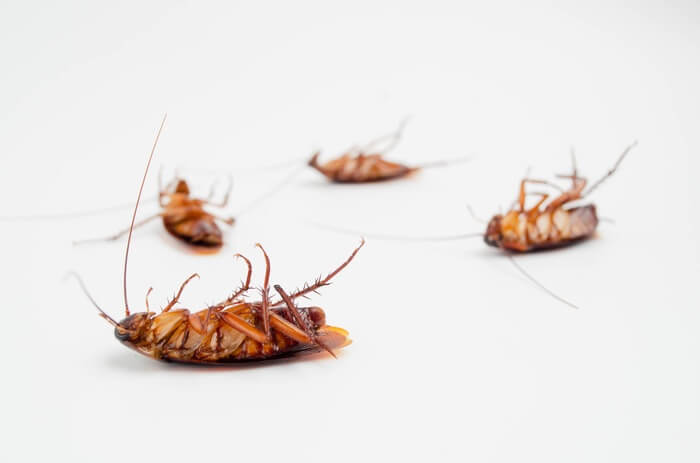
Bleach exterminates roaches through ingestion or drowning. The insects will die if they drink the caustic chemicals or eat something soaked in it. Unfortunately, that rarely ever happens!
The strong scent of bleach is not something that roaches are keen on eating. Most will avoid the presence of bleach altogether, rendering bait-style traps useless.
Even if a roach manages to consume some bleach and start dying, they’re not going to spread it to others in the colony and address the population at large.
As for drowning, this form of roach death is pretty self-explanatory! Dropping a roach into a pool of the cleaning agent will certainly kill them in seconds. But once again, you’re only dealing with one of potentially hundreds of cockroaches.
Quick Tip: You’d have to catch and drown each one individually, which isn’t a great long-term solution to roach problems.
Using Bleach To Kill Cockroach Nests
Bleach might not be a roach-killing powerhouse some people think it is. However, it’s definitely not useless. You can utilize the cleaning agent in other ways to eradicate roaches at the source!
Killing cockroach nests is the best way to address large-scale infestations. Female roaches lay eggs every six weeks or so. The nest is the literal spawning point for these pests! Getting rid of it can make a huge difference.
How does bleach come into all of this? Well, roaches love to create nests in pipes. They’re drawn to water and dark places. Sinks and shower drains are the perfect place to nest!
If you spot some roaches crawling in or out of drainage pipes, grab a cup of bleach. Pour the bleach down the drain slowly and follow it up with several cups of water. That should be more than enough to drown them out.
Quick Tip: It’s important to remember that bleach can be corrosive. Using this method too much can cause severe damage to your pipes. This technique should be your last-ditch effort instead of a regular go-to.
Ways To Use Bleach To Keep Roaches Away
The best way to utilize bleach when dealing with roaches is as a deterrent.
Cockroaches are naturally attracted to all things filth, and are drawn to homes because of the heat and warmth. Once there, they stick around because of the accessibility to food and water.
If you have food crumbs and sticky surfaces everywhere, these pests will come!
You can use bleach to keep roaches away by making your home sanitary and clean. Wipe down common food-covered surfaces like kitchen countertops and tables. The bleach will remove any lasting odor that attracts insects while also ensuring that no crumbs stay behind to feed them.
While you could use any cleaning agent to keep your home spotless, bleach has one major perk. It’s highly toxic to roaches and emits a strong odor that they hate!
Think of it as a scent-based deterrent. Using it to sanitize every corner of your home is like creating a massive “no-go zone” that roaches avoid. Keep up with your cleaning routine, and the bugs should start to migrate out and look elsewhere for food and shelter.
How To Handle Bleach Safely When Killing Cockroaches
Bleach is a standard household product, but it still comes with its risks! If misused, it could pose a severe health risk to you, your kids, and any pets in the home. So before you start using bleach to kill roaches, here are some essential safety tips to keep in mind.
Use Gloves
There’s a reason why bleach is so effective at cutting through grease and grime. It’s corrosive and will burn your skin upon contact. Highly concentrated forms of bleach are the worst offenders.
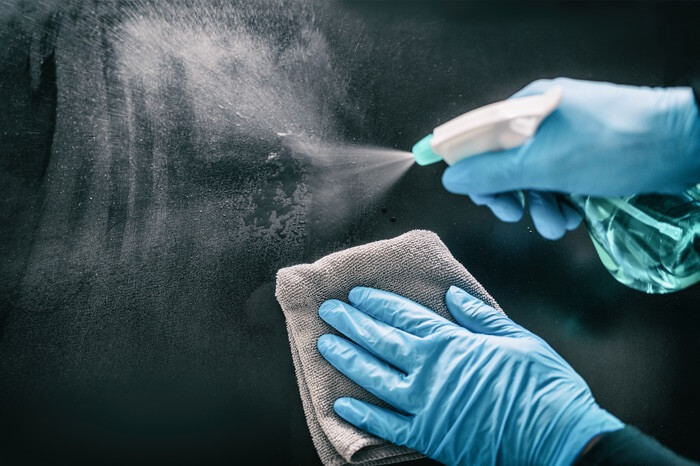
Even a few seconds on your skin can result in some painful burns. Bleach reacts with biological tissue, resulting in irritation and potential cell death.
Needless to say, wearing gloves is paramount. It doesn’t matter if you’re working with a diluted formula or a concentrated one; you don’t want to handle bleach with bare skin when you’re dealing with your roach problem.
Wear A Mask
Inhalation is also something you must avoid. Bleach gives off a strong odor that tends to stay behind for a few hours. Too much exposure could lead to breathing difficulties.
Like concentrated bleach on bare skin, those fumes are perfectly capable of burning the throat and lungs. The smell can even cause eye irritation.
Only use bleach in a well-ventilated area. If you’re working with it up close and personal, wear a mask to keep your eyes, throat, and lungs safe.
Don’t Leave Open Containers Around
You might have heard that leaving small cups of bleach around the home can kill roaches. Some people like to go one step further by soaking bread crumbs and other roach food sources in the stuff.
While that sounds good in theory, it rarely works. Even worse, leaving bleach out in the open is just asking for disaster.
Small pets and children can easily mistake the bleach for something to eat. If ingested, bleach can wreak havoc on a person or animal’s system. In large doses, it can be fatal!
In the event of accidental ingestion, you must provide the person or pet with lots of water or milk. Bleach is an oxidizing agent, so the goal is to dilute it as much as possible. After that, call poison control and seek medical attention!
The best way to avoid all of that is to not leave bleach out in the open. Use it strategically and tackle known problem areas instead.
Don’t Mix Bleach With Anything But Water
You can mix bleach with water and laundry detergent. That’s it! If you attempt to mix it with something else, you could create toxic fumes.
One misguided tip floating around the web is to mix bleach with Pine-Sol. The theory is that it makes a more powerful solution to kill roaches more effectively. However, in reality this mixture creates chlorine gas.
Inhaling chlorine gas is extremely dangerous and harmful to your health.
The same goes for ammonia. Mixing bleach and ammonia results in the production of toxic chloramine gas. Exposure doesn’t just irritate the eyes and throat. It can be downright fatal!
You should only mix bleach with water to dilute it. Never attempt to strengthen it, as that only leads to trouble. Bleach is strong enough to kill or keep roaches away as it is!
Does Bleach Attract Roaches?
Bleach doesn’t attract roaches in any way. In fact, it does the opposite and deters them.
As mentioned earlier, bleach produces strong odors that most bugs hate. The smell is a mild inconvenience at best for us humans. But to a small cockroach, it can be painful to be around.
Because of this, most roaches avoid it like the plague! You can use that fact to your advantage when attempting to deter these pests. However, it’s not going to work for traps.
You might see some people making the failed attempt to lure roaches into eating bleach. That doesn’t work. Mixing bleach with peanut butter or using it to soak food will only drive them away.
The original food scent that would attract them is covered by something they hate!
This is why using bleach as bait serves no purpose. On the off chance that they take the bait, it’s not like the bleach will harm the colony. Unlike standard bait products like boric acid, bleach won’t spread from one roach to another.
It’s best to use bleach as a deterrent instead of a bait trap.
The Chemical Makeup Of Bleach
Bleach is a catch-all kind of product that you can use for many different things around the home (not just killing roaches). Its most common application is in the laundry room, where the cleaning agent brightens white clothing and removes stains.
You might also see it in kitchen products, bathroom products, and more.
There are a few different kinds of bleaches out there. It can come in powder, diluted liquid, or concentrate.
Regardless of the form, bleach is a chemical compound of chlorine, water, and caustic soda.
Most household bleaching products use three to six percent sodium hypochlorite. Powdered oxygen bleach typically contains hydrogen peroxide as its main constituent. Solutions may also include sodium hydroxide and calcium hypochlorite.
All of these chemicals combine to create a sanitizing solution that strips many surfaces of color and grime, and makes it quite lethal to cockroaches (and pretty much any other living thing). There are obviously many different ways you can use it. But as always, it’s important to exercise caution when working with the cleaning agent to avoid harm and illness.
Closing Thoughts
By now you should know that the answer to “does bleach kill roaches?” isn’t as clear-cut as you might like. It really depends on how you use it!
Can it kill cockroaches? Sure.
Is it the best method to kill them? Probably not.
If you have a nest of roaches living in your pipes and you have some bleach handy, you should find success using it to get rid of them. But in most other situations you’ll find better success with another product.
